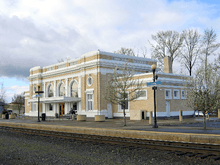Salem station (Oregon)
Salem | ||||||||||||||||
|---|---|---|---|---|---|---|---|---|---|---|---|---|---|---|---|---|
|
| ||||||||||||||||
| Location |
500 13th Street SE Salem, OR United States | |||||||||||||||
| Coordinates | 44°55′56″N 123°01′41″W / 44.93222°N 123.02806°WCoordinates: 44°55′56″N 123°01′41″W / 44.93222°N 123.02806°W | |||||||||||||||
| Owned by | State of Oregon | |||||||||||||||
| Line(s) | Union Pacific Railroad | |||||||||||||||
| Platforms | 1 side platform | |||||||||||||||
| Tracks | 1 | |||||||||||||||
| Connections |
Cascades POINT Greyhound Lines | |||||||||||||||
| Construction | ||||||||||||||||
| Parking | 25 long term spaces | |||||||||||||||
| Bicycle facilities | Yes | |||||||||||||||
| Disabled access | Yes | |||||||||||||||
| Other information | ||||||||||||||||
| Station code | Amtrak code: SLM | |||||||||||||||
| History | ||||||||||||||||
| Opened | 1918 | |||||||||||||||
| Rebuilt | 2000 | |||||||||||||||
| Traffic | ||||||||||||||||
| Passengers (2014) |
60,579[1] | |||||||||||||||
| Services | ||||||||||||||||
| ||||||||||||||||
|
Salem Southern Pacific Railroad Station | ||||||||||||||||
| Area | 2.7 acres (1.1 ha) | |||||||||||||||
| Built | 1918 | |||||||||||||||
| Architectural style | Queen Anne, Beaux Arts | |||||||||||||||
| NRHP Reference # | 10000015[2] | |||||||||||||||
| Added to NRHP | February 12, 2010 | |||||||||||||||
Salem is an Amtrak train station in Salem, Oregon, United States. It is served by the Amtrak Cascades and the Coast Starlight passenger trains.
History

This station was constructed for the Southern Pacific Railroad in 1918 and is the third station to be built at this location.[3] The two previous stations were built in 1871 and 1889.[4] The 1871 depot burned down in 1885.[4] The Queen Anne-style 1889 depot burned down on March 5, 1917.[4]
The current Beaux-Arts-style structure was constructed of masonry and is one of five masonry depots that still exist along the original Southern Pacific West Coast line. The other depots are in Albany, Medford, Roseburg and Eugene.[5]
A restoration project by the Oregon Department of Transportation (ODOT) was completed in 2000.[3][6] Amtrak leases the station from ODOT for $1 a year, in exchange for maintenance of the building and grounds.
An 1889 Railway Express Agency (REA) freight depot/baggage shed survived the fire that destroyed the previous station and is the oldest freight depot still in existence in the state. After the 1917 fire, the Queen Anne-style REA depot was relocated from its original site to south of the passenger station.[4] The REA depot has not been used since the mid-1970s, and now awaits restoration.[4]
The station and baggage depot were added to the National Register of Historic Places on February 12, 2010.[7] In 2011, daily ridership on Amtrak between Salem and Portland reached 24,146 boardings.[8]
Greyhound Lines moved operations from its downtown station to here in 2013 and hopes to use the freight shed in the future.[9][10]
See also
- Close up picture at night
References
- ↑ "Amtrak Fact Sheet, FY2014, State of Oregon" (PDF). Amtrak. November 2014. Retrieved 6 March 2015.
- ↑ Staff (2010-07-09). "National Register Information System". National Register of Historic Places. National Park Service.
- 1 2 "Salem's Railroad Depots". Salem Online History. Retrieved 2007-09-19.
- 1 2 3 4 5 "Salem City Council Agenda: National Register of Historic Places Nomination for Southern Pacific Railroad Depot" (PDF). City of Salem. October 12, 2009. Retrieved 2009-10-12.
- ↑ Christie, Tim (September 7, 2007). "Railroad depot speeds into history books". The Register-Guard. Retrieved 2007-09-19.
- ↑ "Oregon Dept. of Transportation Museum". Oregon Department of Transportation. Retrieved 2007-09-19.
- ↑ National Park Service (2010-02-19). "Weekly List of Actions Taken on Properties: 2/08/10 through 2/12/10". Retrieved 2010-02-19.
- ↑ Rose, Joseph (March 5, 2012). "Amtrak gaining popularity among commuters who ride between Portland, Oregon City and Salem". The Oregonian. Retrieved 2012-03-06.
- ↑ Henderson, Tom (April 29, 2013). "Greyhound on the move in Salem". Daily Journal of Commerce.
- ↑ Rose, Michael (May 7, 2013). "Greyhound to move bus depot to Amtrak station". Statesman Journal.
External links
| Wikimedia Commons has media related to Salem Southern Pacific Railroad Station. |
- Historic images of the 1889 and 1918 depots from Salem Public Library
- Amtrak – Stations – Salem, OR
- Amtrak Stations Database
- Greyhound Lines station page
- Salem, OR (SLM) (Amtrak's Great American Stations)
| ||||||||||||||||||||||||||